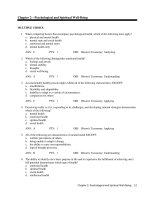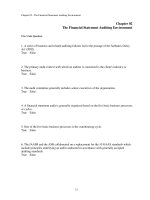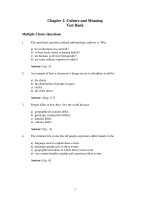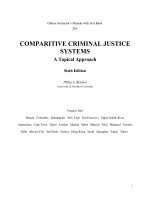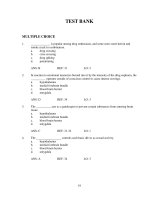World criminal justice systems a comparative survey 8th edition richard terrill test bank
Bạn đang xem bản rút gọn của tài liệu. Xem và tải ngay bản đầy đủ của tài liệu tại đây (299.11 KB, 21 trang )
Terrill: World Criminal Justice Systems, 8th Edition
Chapter 2
Multiple Choice
1. The French Constitution contains a Bill of Rights.
a. True
b. False
Ans: b
2. The president of France is limited to two consecutive terms in office.
a. True
b. False
Ans: b
3. France has a bicameral parliament that consists of the Senate and the House of
Representatives.
a. True
b. False
Ans: b
4. Hugh Capet is generally credited with establishing the first police force in France.
a. True
b. False
Ans: a
5. The French police system is characterized as being a highly centralized national
police system.
a. True
b. False
Ans: a
6. The French judicial police are responsible for investigating serious crimes.
a. True
Copyright © 2012, Elsevier Inc. All rights reserved.
2-2
b. False
Ans: a
7. In order to serve in the French National Police, one must begin his or her career as a
uniformed officer.
a. True
b. False
Ans: b
8. The French Minister of Defense is responsible for the administration of the National
Gendarmerie.
a. True
b. False
Ans: a
9. Like the English, the French have a panel of citizens who investigate serious
complaints about the police.
a. True
b. False
Ans: b
10. The National Gendarmerie is responsible for policing towns with populations under
10,000.
a. True
b. False
Ans: a
11. According to the text, the French have had a difficult time recruiting qualified
candidates for the police service.
a. True
b. False
Ans: b
12. In the French National Police, more than 50 percent of the commissioners of police
hold university degrees.
Copyright © 2012, Elsevier Inc. All rights reserved.
2-3
a. True
b. False
Ans: a
13. Because of the relatively low crime rate, French police have not found it necessary to
develop a crime prevention program.
a. True
b. False
Ans: b
14. Women cannot serve as police officers in the French National Gendarmerie.
a. True
b. False
Ans: b
15. In the medieval period, the right of wealthy landowners to administer justice in their
territory was a characteristic of feudalism.
a. True
b. False
Ans: a
16. The French Court of Cassation consists of nine justices.
a. True
b. False
Ans: b
17. In all French trial courts, judges sit in panels of three to hear the case.
a. True
b. False
Ans: b
18. To become a judge in France, the person runs on a nonpartisan ballot during the
general elections.
Copyright © 2012, Elsevier Inc. All rights reserved.
2-4
a. True
b. False
Ans: b
19. A member of the French magistracy can choose a career as a judge or a procurator.
a. True
b. False
Ans: a
20. The principle of stare decisis does not exist in France.
a. True
b. False
Ans: a
21. When a court case is appealed in France on the grounds that a person’s constitutional
rights have been violated, the appeal is heard in the Constitutional Council.
a. True
b. False
Ans: b
22. As is the case in England and the United States, French judges may issue dissenting
opinions when ruling on cases on appeal.
a. True
b. False
Ans: b
23. In a French criminal trial in which a victim has a civil claim against the defendant,
that issue can be heard concurrently with the criminal case.
a. True
b. False
Ans: a
24. Like English lawyers, French lawyers are divided into two distinct groups.
a. True
Copyright © 2012, Elsevier Inc. All rights reserved.
2-5
b. False
Ans: b
25. The method of French legal education is essentially theoretical in nature.
a. True
b. False
Ans: a
26. The 1981 Security and Liberty Law curtailed the discretionary authority of the French
police.
a. True
b. False
Ans: b
27. During a French preliminary investigation into an offense, the legal validity for
detaining a suspect is determined through a writ of habeas corpus.
a. True
b. False
Ans: b
28. Following a French preliminary investigation into a serious criminal allegation, the
merits of the case are reviewed in the chamber of instruction of a court of appeal.
a. True
b. False
Ans: a
29. The French police have the power to detain a person for up to 24 hours; if they wish
to extend the period of detention, they must seek the approval of an officer above the
rank of lieutenant.
a. True
b. False
Ans: b
30. In France, witnesses who declare knowledge of a crime but refuse to answer
questions posed to them by an investigating judge can be sentenced to jail for up to
Copyright © 2012, Elsevier Inc. All rights reserved.
2-6
one year.
a. True
b. False
Ans: a
31. An accused has the legal right in France to consult with a lawyer before his or her
initial appearance before an investigating judge.
a. True
b. False
Ans: a
32. In France, searches and seizures are legal without a warrant if the crime is flagrant.
a. True
b. False
Ans: a
33. A French chamber of instruction has the authority to rule on the admissibility of
evidence.
a. True
b. False
Ans: a
34. The most important source of French criminal law is the Penal Code.
a. True
b. False
Ans: a
35. France has abolished capital punishment.
a. True
b. False
Ans: a
36. France does not have a procedure for bail.
Copyright © 2012, Elsevier Inc. All rights reserved.
2-7
a. True
b. False
Ans: b
37. French trial lawyers strongly support the legal aid scheme.
a. True
b. False
Ans: b
38. While French jurors in a court of assize vote with judges to determine the guilt or
innocence of the accused, they do not participate in determining the sentence.
a. True
b. False
Ans: b
39. The Security and Liberty Law (1981) has enhanced the discretionary authority of the
French procurator.
a. True
b. False
Ans: a
40. In France, a fine can be imposed on a person who has committed either a crime, delit,
or contravention.
a. True
b. False
Ans: a
41. The 1994 Penal Code of France stipulates a maximum and minimum sentence for all
offenses.
a. True
b. False
Ans: b
42. In France, the minimum term of incarceration is six months.
Copyright © 2012, Elsevier Inc. All rights reserved.
2-8
a. True
b. False
Ans: a
43. When a person is found guilty of a contravention in France, the sanction is limited to
a fine, a noncustodial sentence or both.
a. True
b. False
Ans: a
44. In France, the work of the probation department is under the control of the
post-sentencing judge.
a. True
b. False
Ans: a
45. French police play an active role in diverting juveniles from the formal juvenile
justice system.
a. True
b. False
Ans: a
46. In cases involving juveniles, due process procedures are often ignored in France.
a. True
b. False
Ans: a
47. In France, children under 13 years of age are always protected from any type of
criminal proceeding.
a. True
b. False
Ans: b
48. When a juvenile between the ages of 15 and 18 commits a crime in France, the case is
adjudicated in the court of assize for juveniles.
Copyright © 2012, Elsevier Inc. All rights reserved.
2-9
a. True
b. False
Ans: a
49. Juvenile judges in France are lay people who have a special interest in children.
a. True
b. False
Ans: b
50. Until recently, the French juvenile justice system emphasized a closed treatment
model.
a. True
b. False
Ans: b
51. The French Constitution calls for a powerful:
a.
b.
c.
d.
President
Council of Ministers
Premier
National Assembly
Ans: a
52. The French government is organized and administered according to the Constitution
of the:
a.
b.
c.
d.
Fourth Republic
Fifth Republic
Sixth Republic
none of these
Ans: b
53. The person largely responsible for initiating efforts at decentralizing France’s system
of government was:
a. Charles de Gaulle
b. Valery Giscard d’Estaing
c. Jean-Marie Le Pen
Copyright © 2012, Elsevier Inc. All rights reserved.
2-10
d. Francois Mitterrand
Ans: d
54. The National Police of France was created in:
a.
b.
c.
d.
1791
1800
1854
1966
Ans: d
55. The largest police system in France is:
a.
b.
c.
d.
the army
the National Police
the Sûreté
the National Gendarmerie
Ans: b
56. The French politician responsible for the National Police is:
a.
b.
c.
d.
the minister of justice
the minister of police
the minister of the interior
the minister of security
Ans: c
57. France’s Republican Security Company is responsible for:
a.
b.
c.
d.
guarding members of France’s Republican Party
serving as a riot police unit
private security work, like the Pinkertons
none of these
Ans: b
58. The legal status of the French police is explained in:
a.
b.
c.
d.
case law
the Constitution
the Code of Criminal Procedure
none of these
Copyright © 2012, Elsevier Inc. All rights reserved.
2-11
Ans: c
59. According to the text, the most common view of the relationship between the police
and the public of France is one of:
a.
b.
c.
d.
strong acceptance
strained tolerance
serious opposition
indifference
Ans: b
60. The National Gendarmerie of France is characterized as:
a.
b.
c.
d.
a military police force
a civilian police force
a citizens auxiliary force
none of these
Ans: a
61. Municipal police forces in France are under the administrative control of:
a.
b.
c.
d.
the National Police
the mayor of the municipality
the National Gendarmerie
the city council of the municipality
Ans: b
62. Basic training for a uniform patrol officer in the French National Police lasts:
a.
b.
c.
d.
12 months
10 months
six months
six weeks
Ans: a
63. The idea that the French king was the source of all justice became popular in the:
a.
b.
c.
d.
tenth century
twelfth century
fourteenth century
sixteenth century
Copyright © 2012, Elsevier Inc. All rights reserved.
2-12
Ans: b
64. In medieval France, the royal court responsible for criminal matters was:
a.
b.
c.
d.
the Court of Requests
the Chamber of Pleas
the Tournelle
the Court of Inquests
Ans: c
65. Until the twelfth century, there was only one coherent unified legal system that could
serve as a point of legal reference, and it was:
a.
b.
c.
d.
Greek law
Roman law
canon law
none of these
Ans: c
66. The French Constitutional Council handles:
a.
b.
c.
d.
election complaints
issues involving the French exclusionary rule
disputes in the Senate
all of these
Ans: a
67. The French Ministry of Justice is responsible for:
a.
b.
c.
d.
the correctional system
general administration of the law
selection and appointment of magistrates
all of these
Ans: d
68. The ultimate French court of appeal is:
a.
b.
c.
d.
the Constitutional Council
the High Court of the Judiciary
the Court of Cassation
the Court of Appeal
Copyright © 2012, Elsevier Inc. All rights reserved.
2-13
Ans: c
69. The period of training for judges and procurators in France is approximately:
a.
b.
c.
d.
31 months
24 months
12 months
six months
Ans: a
70. The National Bar Council of France is responsible for:
a.
b.
c.
d.
representing the legal profession before Parliament
establishing uniformity in the rules and regulations of local bar associations
supervising regional training centers for lawyers
all of these
Ans: d
71. French jurors are selected from annual lists established by:
a.
b.
c.
d.
voting rolls
the census
tax rolls
political party affiliation
Ans: a
72. French juries are utilized in:
a.
b.
c.
d.
the courts of minor jurisdiction
the courts of major jurisdiction
the courts of assize
all of these
Ans: c
73. By law French judges are:
a.
b.
c.
d.
required to adhere to the principle of stare decisis
elected to their position
required to offer a written opinion in their cases
none of these
Copyright © 2012, Elsevier Inc. All rights reserved.
2-14
Ans: c
74. The French legal system is often referred to as a:
a.
b.
c.
d.
civil law system
socialist law system
canon law system
common law system
Ans: a
75. French inquisitorial procedures have their origins in:
a.
b.
c.
d.
French custom
Roman custom
Roman Catholic custom
German custom
Ans: c
76. The introduction of inquisitorial procedures in all French courts occurred during the
reign of:
a.
b.
c.
d.
Francis I
Louis XIII
Louis XIV
Napoleon
Ans: a
77. French procurators are responsible for defending the specific interests of:
a.
b.
c.
d.
the state
the victim
society
all of these
Ans: c
78. Following a hearing in a French chamber of instruction, the chamber can:
a.
b.
c.
d.
dismiss a case
issue an indictment
reduce the charges
all of these
Copyright © 2012, Elsevier Inc. All rights reserved.
2-15
Ans: d
79. In France, warrants for an arrest require that the arrested suspect be brought before an
investigating judge for questioning within:
a.
b.
c.
d.
12 hours
24 hours
36 hours
48 hours
Ans: d
80. A person who does not possess adequate identification can be detained at a French
police station for up to six hours according to:
a.
b.
c.
d.
the Constitution
the Penal Code
the Code of Criminal Procedure
the Security and Liberty Law
Ans: d
81. In France, warrants for searches and seizures are issued by:
a.
b.
c.
d.
the judicial police
the post-sentencing judge
the investigating judge
the clerk of the court
Ans: c
82. If the judicial police of France conduct an illegal search, they can be subject to:
a.
b.
c.
d.
disciplinary action
penal sanctions
civil proceedings
all of these
Ans: d
83. Legal aid in France is dispersed by:
a.
b.
c.
d.
the procurator
the investigating judge
the chamber of instruction
none of these
Copyright © 2012, Elsevier Inc. All rights reserved.
2-16
Ans: d
84. In France, the number of challenges a defense lawyer can use when selecting a jury
is:
a.
b.
c.
d.
four
five
nine
unlimited
Ans: b
85. The number of people who sit on a French jury is:
a.
b.
c.
d.
15
12
nine
six
Ans: c
86. In France, a preliminary investigation into a crime can be conducted by:
a.
b.
c.
d.
the police
a procurator
a magistrate
all of these
Ans: d
87. French courts of assize are presided over by a judge from:
a.
b.
c.
d.
a court of appeal
a court of major jurisdiction
the Court of Cassation
none of these
Ans: a
88. In order to have a case brought to the French Court of Cassation, the person must:
a.
b.
c.
d.
petition that a constitutional right was violated
petition for review directly to the Court of Cassation
petition for review to the court that handed down the decision in dispute
petition the Constitutional Council
Copyright © 2012, Elsevier Inc. All rights reserved.
2-17
Ans: c
89. The 1994 Penal Code of France acknowledges the emergence of new offenses, such
as:
a.
b.
c.
d.
sexual harassment
liability of corporations
environmental offenses
all of these
Ans: d
90. The French have retained the death penalty for:
a.
b.
c.
d.
murder
rape
espionage
none of these
Ans: d
91. The French post-sentencing judge is responsible for:
a.
b.
c.
d.
presiding over a criminal trial
sentencing a person found guilty by a trial court
sentencing those people who have agreed to plea bargain
controlling the post-sentencing phase of the criminal process
Ans: d
92. A person serving a life sentence in France is eligible for parole after serving:
a.
b.
c.
d.
five years
10 years
15 years
20 years
Ans: c
93. When a person is found guilty of a delit in France, the term of imprisonment cannot
exceed:
a. two months
b. six months
c. five years
Copyright © 2012, Elsevier Inc. All rights reserved.
2-18
d. 10 years
Ans: d
94. The French Penal Code of 1994 acknowledged new forms of deviance that included:
a.
b.
c.
d.
breaches of human rights
racketeering
liability for corporations
all of these
Ans: d
95. The French correctional system is under the jurisdiction of:
a.
b.
c.
d.
the Ministry of the Interior
the Home Ministry
the Ministry of Justice
the Ministry of Corrections
Ans: c
96. In France, an offender must agree to a community service order in order to comply
with:
a.
b.
c.
d.
the Constitution
the Penal Code
the European Convention of Human Rights
the Security and Liberty Law
Ans: c
97. The age of adult responsibility in France is:
a.
b.
c.
d.
16
18
20
21
Ans: b
98. A French judge can impose a full penal sanction on a juvenile if the offender has
reached the age of:
a. 13
b. 14
Copyright © 2012, Elsevier Inc. All rights reserved.
2-19
c. 15
d. 16
Ans: d
99. In France, a court of assize for juveniles consists of:
a.
b.
c.
d.
three judges
three judges and nine jurors
one judge and five jurors
one judge and two jurors
Ans: b
100.
a.
b.
c.
d.
For most offenses, the French police can detain a juvenile for up to:
36 hours
24 hours
18 hours
12 hours
Ans: b
ESSAY
101.
Identify and explain the significance in one or two paragraphs: Office of the
President of France
102.
Identify and explain the significance in one or two paragraphs: Ministry of the
Interior
103.
Identify and explain the significance in one or two paragraphs: National
Gendarmerie
104.
Identify and explain the significance in one or two paragraphs: Republican
Security Company
105.
Identify and explain the significance in one or two paragraphs: The Constitutional
Council courts of assize
106.
Identify and explain the significance in one or two paragraphs: National School
for the Judiciary
107.
Identify and explain the significance in one or two paragraphs: Ordinance of
Villers-Cotterets (1539)
Copyright © 2012, Elsevier Inc. All rights reserved.
2-20
108.
Identify and explain the significance in one or two paragraphs: Justinian
109.
Identify and explain the significance in one or two paragraphs: Code of Criminal
Procedure
110.
Identify and explain the significance in one or two paragraphs: garde a vue
111.
Identify and explain the significance in one or two paragraphs: flagrant offense
112.
Identify and explain the significance in one or two paragraphs: investigating judge
113.
Identify and explain the significance in one or two paragraphs: chamber of
instruction
114.
Identify and explain the significance in one or two paragraphs: post-sentencing
judge
115.
Identify and explain the significance in one or two paragraphs: juvenile judge
116.
Write an essay on the French police that describes the organization and
administration of the police, explains the legal status of the police, and examines
the relationship between the police and the public.
117.
Write an essay on the French judiciary that describes the organization and duties
of each court in the judicial hierarchy and explains the various branches of the
legal profession.
118.
Write an essay in which the legal position of the French police is explored
regarding the power to detain and arrest, the power to interrogate, and the power
to search and seize.
119.
Write an essay on the French correctional system that describes the organization
and administration of the system, explains the specific role of the post-sentencing
judge, and indicates the noninstitutional sanctions available in France.
120.
Write an essay on the French juvenile justice system that describes the
organization and administration of the system and explains the sanctions available
to the authorities.
121.
Identify four critical issues confronting the French criminal justice system and
write an essay in which you explain why they are critical. No more than two
issues can come from the same component of the justice system, that is the police,
the judiciary, law, corrections, and juvenile justice.
122.
Write an essay in which the history of the French and English police are
compared, and indicate how that history has influenced or has not influenced
Copyright © 2012, Elsevier Inc. All rights reserved.
2-21
present methods of policing in the two countries.
123.
Write a comparative essay on the historical development either of the judiciary,
the law, or both in France and England; indicate how the past either continues to
influence or does not influence these modern aspects of the justice systems of
these two countries.
124.
Write an essay in which you discuss the extent to which France has embraced the
rule of law.
125.
Write an essay in which you first explain the differences in Herbert Packer’s
Crime Control and Due Process Models and then discuss which model best
represents the criminal process of France.
Copyright © 2012, Elsevier Inc. All rights reserved.
